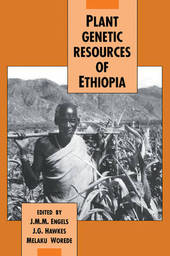
|
Plant Genetic Resources of Ethiopia
Paperback / softback
Main Details
| Title |
Plant Genetic Resources of Ethiopia
|
| Authors and Contributors |
Edited by J. M. M. Engels
|
|
Edited by J. G. Hawkes
|
|
Edited by M. Worede
|
| Physical Properties |
| Format:Paperback / softback | | Pages:400 | | Dimensions(mm): Height 229,Width 152 |
|
| Category/Genre | Botany and plant sciences
Agronomy and crop production |
|---|
| ISBN/Barcode |
9780521065535
|
| Classifications | Dewey:631.523 |
|---|
| Audience | | Professional & Vocational | |
|---|
| Illustrations |
Worked examples or Exercises
|
|
Publishing Details |
| Publisher |
Cambridge University Press
|
| Imprint |
Cambridge University Press
|
| Publication Date |
19 June 2008 |
| Publication Country |
United Kingdom
|
Description
One of the world centres of crop evolution and origin, Ethiopia has long been recognized as an important area of diversity for several major and various minor crops. Based on an international conference held in Addis Ababa, this book describes how this genetic diversity is of vital importance in breeding varieties of crops with desirable characteristics such as increased resistance to pests and diseases and greater adaptation to heat and drought. The three main sections in the book consider the Ethiopian centre of diversity, germplasm collection and conservation in Ethiopia and the evaluation and utilization of Ethiopian genetic resources. A broad range of food and feed crops and plants of medicinal and industrial importance are discussed, both at a national and international level. A brief account of those conservation strategies and genebank problems unique to Ethiopia is also given. The importance of Ethiopia's plant genetic resources to world agriculture has been demonstrated on more than one occasion.
Reviews"Plant breeders, geneticists, and botanists will find the book useful." Biological Abstracts "Too often we view plant genetic resources as diffusion out of the Near Eastern center into North Africa, Ethiopia, and Northern India; we often forget that there were contacts of people and crops in other directions. This volume is important as an antidote to an Aryan-centered view of the world...Plant breeders of crops with Ethiopian germplasm will find this book worth reading." Giles Waines, The Quarterly Review of Biology
|